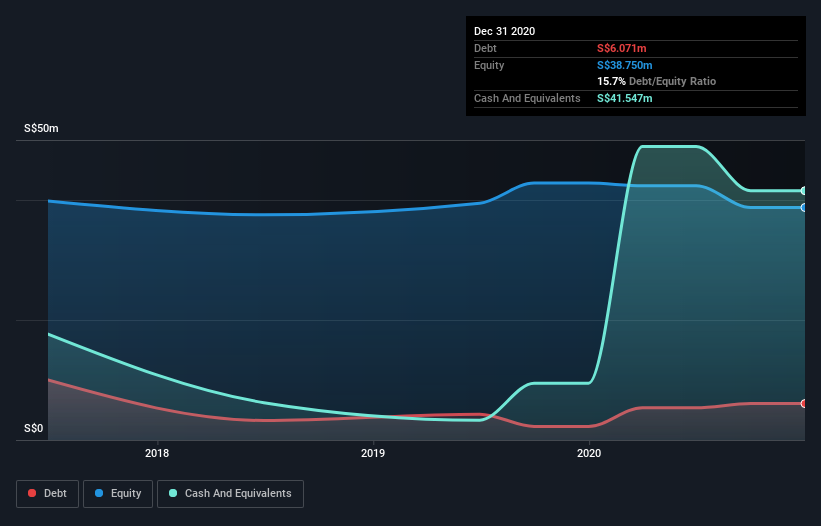Warren Buffett famously said, 'Volatility is far from synonymous with risk.' So it might be obvious that you need to consider debt, when you think about how risky any given stock is, because too much debt can sink a company. As with many other companies Kwan Yong Holdings Limited (HKG:9998) makes use of debt. But is this debt a concern to shareholders?
Why Does Debt Bring Risk?
Debt and other liabilities become risky for a business when it cannot easily fulfill those obligations, either with free cash flow or by raising capital at an attractive price. Part and parcel of capitalism is the process of 'creative destruction' where failed businesses are mercilessly liquidated by their bankers. However, a more usual (but still expensive) situation is where a company must dilute shareholders at a cheap share price simply to get debt under control. Of course, the upside of debt is that it often represents cheap capital, especially when it replaces dilution in a company with the ability to reinvest at high rates of return. The first thing to do when considering how much debt a business uses is to look at its cash and debt together.
See our latest analysis for Kwan Yong Holdings
How Much Debt Does Kwan Yong Holdings Carry?
As you can see below, at the end of December 2020, Kwan Yong Holdings had S$6.07m of debt, up from S$2.26m a year ago. Click the image for more detail. But it also has S$41.5m in cash to offset that, meaning it has S$35.5m net cash.

A Look At Kwan Yong Holdings' Liabilities
The latest balance sheet data shows that Kwan Yong Holdings had liabilities of S$54.8m due within a year, and liabilities of S$5.74m falling due after that. Offsetting this, it had S$41.5m in cash and S$27.5m in receivables that were due within 12 months. So it actually has S$8.58m more liquid assets than total liabilities.
This excess liquidity suggests that Kwan Yong Holdings is taking a careful approach to debt. Because it has plenty of assets, it is unlikely to have trouble with its lenders. Succinctly put, Kwan Yong Holdings boasts net cash, so it's fair to say it does not have a heavy debt load! When analysing debt levels, the balance sheet is the obvious place to start. But you can't view debt in total isolation; since Kwan Yong Holdings will need earnings to service that debt. So if you're keen to discover more about its earnings, it might be worth checking out this graph of its long term earnings trend.
Over 12 months, Kwan Yong Holdings made a loss at the EBIT level, and saw its revenue drop to S$68m, which is a fall of 61%. That makes us nervous, to say the least.
So How Risky Is Kwan Yong Holdings?
While Kwan Yong Holdings lost money on an earnings before interest and tax (EBIT) level, it actually generated positive free cash flow S$9.0m. So although it is loss-making, it doesn't seem to have too much near-term balance sheet risk, keeping in mind the net cash. We'll feel more comfortable with the stock once EBIT is positive, given the lacklustre revenue growth. There's no doubt that we learn most about debt from the balance sheet. However, not all investment risk resides within the balance sheet - far from it. To that end, you should learn about the 3 warning signs we've spotted with Kwan Yong Holdings (including 1 which doesn't sit too well with us) .
Of course, if you're the type of investor who prefers buying stocks without the burden of debt, then don't hesitate to discover our exclusive list of net cash growth stocks, today.
If you’re looking to trade a wide range of investments, open an account with the lowest-cost* platform trusted by professionals, Interactive Brokers. Their clients from over 200 countries and territories trade stocks, options, futures, forex, bonds and funds worldwide from a single integrated account. Promoted
Valuation is complex, but we're here to simplify it.
Discover if Kwan Yong Holdings might be undervalued or overvalued with our detailed analysis, featuring fair value estimates, potential risks, dividends, insider trades, and its financial condition.
Access Free AnalysisThis article by Simply Wall St is general in nature. It does not constitute a recommendation to buy or sell any stock, and does not take account of your objectives, or your financial situation. We aim to bring you long-term focused analysis driven by fundamental data. Note that our analysis may not factor in the latest price-sensitive company announcements or qualitative material. Simply Wall St has no position in any stocks mentioned.
*Interactive Brokers Rated Lowest Cost Broker by StockBrokers.com Annual Online Review 2020
Have feedback on this article? Concerned about the content? Get in touch with us directly. Alternatively, email editorial-team (at) simplywallst.com.
About SEHK:9998
Kwan Yong Holdings
An investment holding company, engages in the provision of general building and construction services in Singapore.
Excellent balance sheet and fair value.
Market Insights
Community Narratives




